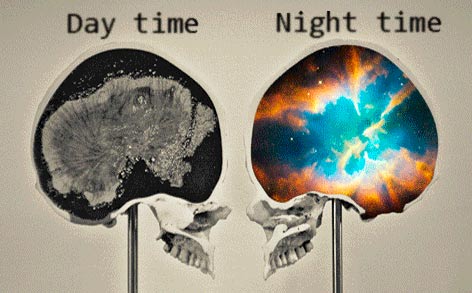Life
12 Interesting Facts About The Power of Your Dreams
Dreams are fascinating and curious and everyone has them; if you can remember each and every one of them though is another question. It is interesting to look at what happens when you dream, why some people seem to remember their dreams more than others, and if dreams really have any true significance.
Below are 12 facts about the power of your dreams, ranging from the complex to the absurd; so if you are fascinated by dreams, read on:
Why & How You Dream
What Happens When You Dream?
 Dreaming can be divided into stages, the first being when the central nervous system begins to fire up. Dreaming occurs in the deepest part of your sleep when your brain is only experiencing delta waves. After around ninety minutes of rapid eye movement sleep, your heart rate and breathing quicken as the nervous systems fires up and your brain starts to receive signals to the thalamus. This information that comes from the base of the brain is a dream.
Dreaming can be divided into stages, the first being when the central nervous system begins to fire up. Dreaming occurs in the deepest part of your sleep when your brain is only experiencing delta waves. After around ninety minutes of rapid eye movement sleep, your heart rate and breathing quicken as the nervous systems fires up and your brain starts to receive signals to the thalamus. This information that comes from the base of the brain is a dream.
Once dreaming commences, Cortisol is produced in large quantities, Cortisol being the chemical responsible for memory consolidation. Both men and women will become sexually aroused throughout dreaming, but you will never normally leave your bed. Whilst dreaming the brain also releases glycine which paralyses your muscles and stops you from taking a walk anywhere and stops you from harming yourself or running into danger.
The Human mind is able to control dreams
 There are certain phases within normal dreaming and during “lucid dreaming” it is actually possible to control what will happen in your dream, the outcome, and even change the course of the dream if you are unhappy with the pending outcome.
There are certain phases within normal dreaming and during “lucid dreaming” it is actually possible to control what will happen in your dream, the outcome, and even change the course of the dream if you are unhappy with the pending outcome.
Manipulating dreams can be fun, and most especially on the occasions where you are fortunate enough to remember a dream, you can wake feeling elated in the knowledge that you controlled your own destiny. What you dream about is often something that you have witnessed in the past, and under these circumstances the human mind is able to “change the course of history” whilst asleep.
You can wake to act out what you were dreaming about
 Dreams can cause incorporation. What this means in simple terms is that you may often wake to indulge in an activity that you were dreaming about. If you are constantly thirsty in your dream you can wake to go and drink water, and if you were hungry in your dream chances are you will head to the fridge when you wake up.
Dreams can cause incorporation. What this means in simple terms is that you may often wake to indulge in an activity that you were dreaming about. If you are constantly thirsty in your dream you can wake to go and drink water, and if you were hungry in your dream chances are you will head to the fridge when you wake up.
A need to use the bathroom can also occur during dreams and once again chances are you will wake with the urge to urinate.
The language used in dreams is indirect
 One reason that it is often difficult to interpret or even understand a dream lies with the fact that dreams do not use the same language as when one is awake. The language used in dreams is very indirect and symbols are often used that can be interpreted, but only by the subconscious mind. For this reason many books have been written on the interpretation of dreams, people becoming deeply fascinating by their dreams and needing to comprehend them.
One reason that it is often difficult to interpret or even understand a dream lies with the fact that dreams do not use the same language as when one is awake. The language used in dreams is very indirect and symbols are often used that can be interpreted, but only by the subconscious mind. For this reason many books have been written on the interpretation of dreams, people becoming deeply fascinating by their dreams and needing to comprehend them.
If you remember a dream it will often be made of scenes or pieces of information that are familiar to you, but jumbled into an order that makes little or no sense; the more you try to understand what you have dreamed, the more intriguing it all becomes.
In general dreams are not remembered
 You may believe that some people remember dreams more than others and this in part may be true. However, it is normally hard to remember a whole dream and quite hard to remember one or more sequences that make up a dream. It is believed that you will only remember what you were dreaming about if you are woken up during REM sleep. This can explain why people will say that they regret their alarm sounding as it interrupted a great dream, but the truth is that if they had been left to wake up naturally they would not have remembered it.
You may believe that some people remember dreams more than others and this in part may be true. However, it is normally hard to remember a whole dream and quite hard to remember one or more sequences that make up a dream. It is believed that you will only remember what you were dreaming about if you are woken up during REM sleep. This can explain why people will say that they regret their alarm sounding as it interrupted a great dream, but the truth is that if they had been left to wake up naturally they would not have remembered it.
You often dream of forbidden pleasures
 If you are on a diet and watching your weight, you may dream about gorging on chocolate. If you have your eye secretly on a work colleague, but you are married, you may well dream of a time you were together. After this kind of dream the person often experiences guilt or embarrassment, especially if they dreamed they slept with their boss! In fact, psychological disorders can even have an effect on the way one dreams.
If you are on a diet and watching your weight, you may dream about gorging on chocolate. If you have your eye secretly on a work colleague, but you are married, you may well dream of a time you were together. After this kind of dream the person often experiences guilt or embarrassment, especially if they dreamed they slept with their boss! In fact, psychological disorders can even have an effect on the way one dreams.
So, if you dreamed of a forbidden pleasure, don’t feel guilty about it, rest assured that you were not the only one!
Not all people are able to dream in colour
 Not all people will dream in colour. Only being able to dream in black and white is common with around a third of people reporting this finding. The reason behind this is still being researched, as it the reason that only some people will have repetitive dreams.
Not all people will dream in colour. Only being able to dream in black and white is common with around a third of people reporting this finding. The reason behind this is still being researched, as it the reason that only some people will have repetitive dreams.
Repetitive dreams are most frequently bad dreams and these may range from dreaming you have failed your driving test, to dreaming that someone dear to you is dead when they are alive. The relevance of colour in dreaming as well as repetitive dreams is still being researched, one dream that many people experience frequently being running away from something or someone.
Dreaming keeps you healthy
 Being woken up regularly during REM sleep is said to have a profound negative effect on mental and physical health.
Being woken up regularly during REM sleep is said to have a profound negative effect on mental and physical health.
Studies have shown that people who never manage to experience real dreaming as they are constantly being woken up are far more likely to suffer from psychotic episodes and even hallucinations.
When you are deep in a dream, your body is releasing stress and helping you come to terms with some of the built up emotional troubles during your past week, this is a great way for your body to relieve itself of stress for clear thinking and better judgement.
Blind people dream too
 Research has come up with some very interesting findings that concern dreaming and those who are visually impaired. All visually impaired people were noted to dream, but those who were born with no vision only dreamed in senses of touch, noise, and smell.
Research has come up with some very interesting findings that concern dreaming and those who are visually impaired. All visually impaired people were noted to dream, but those who were born with no vision only dreamed in senses of touch, noise, and smell.
People who had lost their eyesight after birth were however reported to still be able to dream visually.
Your pets dream too
 Sleep patterns in animals, most especially mammals has been monitored and the finding are very interesting indeed. Animals experience the same different stages of sleep as humans, and although it is not possible to ask a pet about their dream, it is possible to watch a pet while he is dreaming.
Sleep patterns in animals, most especially mammals has been monitored and the finding are very interesting indeed. Animals experience the same different stages of sleep as humans, and although it is not possible to ask a pet about their dream, it is possible to watch a pet while he is dreaming.
In fact, if your dog wakes up after hearing a noise such as the phone or door bell and appears startled or behaves strangely, chances are that you have disturbed their dream.
Some great inventions were first thought of whilst dreaming
 The human being does not start dreaming until around the age of three years old, but after this age the mind can become very inventive when asleep.
The human being does not start dreaming until around the age of three years old, but after this age the mind can become very inventive when asleep.
Alexander Graham Bell dreamed of the phone before he went on to invent it, and many people frequently jot down interesting thoughts when they wake from dreaming.
Paul McCartney from “The Beatles” also states that he discovered the tune for “Yesterday” while he was dreaming. The King of horror, Stephen King admits to a number of successful story ideas coming to him while he dreamed.
Have you come with any amazing ideas through a dream that proved to be successful? Or even know of someone else who has? If so, please share it with us in our comment section.
Dreams provide us with a look into our subconscious
 Dreams allow us to see into the subconscious mind and reveal our darkest fantasies.
Dreams allow us to see into the subconscious mind and reveal our darkest fantasies.
Sigmund Freud said that dreams allow you to fulfil your wishes, whilst Carl Jung said they are put in place to correct an imbalance in the psyche. When you are feeling down about yourself, you will often experience dreams where you achieve something and become elated; however, when you are happy in your conscious mind, you will often dream of falling down.
The Power Of Your Dreams

I hope these facts have helped you to understand your dreams a little better so that you can use it to your advantage. Thanks for dropping by!
Life
Imposter Syndrome Is Rooted in Your Past But Here’s How You Can Rewire It
Imposter syndrome is most prevalent in highly successful women

Imposter syndrome is “the persistent inability to believe that one’s success is deserved or has been legitimately achieved as a result of one’s own efforts or skills.” (more…)
Life
The Surprising Mental Health Tool You Probably Haven’t Tried
Through journaling, I arrived at a more balanced perspective, it reinstated my sense of gratitude and led me to accept my disability

In two particularly difficult times in my adult life, my journaling practice is helping me heal emotionally. It has been a vital tool for helping me see the bigger picture and land in a place of gratitude. (more…)
Life
How to Stop Comparing Yourself to Others and Find True Happiness
Comparison is the thief of joy; it robs us of our happiness, self-esteem, and peace of mind

In today’s hyperconnected world, it’s easier than ever to fall into the trap of comparing ourselves to others. Social media platforms like Instagram, Facebook, and LinkedIn constantly bombard us with curated highlights of other people’s lives, making it seem like everyone else is happier, more successful, and more fulfilled than we are. (more…)
Life
Harness the ‘Battery Effect’ to Transform Life’s Tensions into Your Greatest Strength
Recharge your life batteries by shifting your mindset today

I believe our life capacity is determined by the skillsets we develop on this spinning rock we call Earth. By “life capacity,” I mean our ability to embrace and sustain joy. (more…)
-

 Success Advice4 weeks ago
Success Advice4 weeks agoThe One Mindset Shift That Made Me Irreplaceable At Work
-

 Did You Know3 weeks ago
Did You Know3 weeks ago7 Surprising Life Lessons Video Games Taught Me That School Never Did
-

 Success Advice3 weeks ago
Success Advice3 weeks agoHow Playing by the Rules Became the Smartest Business Strategy
-

 Success Advice3 weeks ago
Success Advice3 weeks agoHow to Build Trust, Kill Micromanagement, and Lead a Team That Thrives
-

 Scale Your Business3 weeks ago
Scale Your Business3 weeks agoHow to Build a Workplace People Actually Want to Show Up To
-

 Success Advice2 weeks ago
Success Advice2 weeks agoSuccess Isn’t Sexy: 5 Daily Habits That Actually Work
-

 Scale Your Business2 weeks ago
Scale Your Business2 weeks agoHow Smart Entrepreneurs Cut Financial Chaos in Half with One Simple Switch
-

 Success Advice2 weeks ago
Success Advice2 weeks agoBreaking the Bias: How Females Can Thrive In The Workplace in 2025






























6 Comments